Olympic gold medalist and visionary executive Benita Fitzgerald Mosley says it has been her lifelong mission to help people win gold medals in business–and in life.
“My gold medal is the gift that keeps on giving,” Fitzgerald Mosley says. “I am forever grateful, so I want to pay that gift forward.”
To get there, Fitzgerald Mosley highlights five “Olympic rings” to help people achieve their goals: Have a good start, set high goals, run your own race, power through hurdles, and have a strong finish.
“You have to ask yourself, why not me?’’ Fitzgerald Mosley says. “Why can’t I be the best in the world at what I do?”
From becoming the first African-American woman to win the 100-meter hurdles at the 1984 Olympics to her current role as chief executive officer of Multiplying Good, Fitzgerald Mosley has persistently broken barriers and advanced the idea that sport has the power to inspire and change the world.
Her enormous impact as a results-oriented leader in the Olympic, non-profit, and corporate worlds is why Falk College Dean Jeremy Jordan asked Fitzgerald Mosley to be the keynote speaker at the Falk Convocation at 12:30 p.m. May 10 in the Lally Athletic Complex.
“Benita’s ‘why not me?’ message encourages us to challenge societal expectations and embrace our potential, while Multiplying Good is helping people bring about positive change and inspiring them to do more,” Jordan says. “The life lessons and insights that Benita will share May 10 will provide valuable inspiration to our graduates and all of us.”
Using Fitzgerald Mosley’s five Olympic rings, here is her remarkable story:
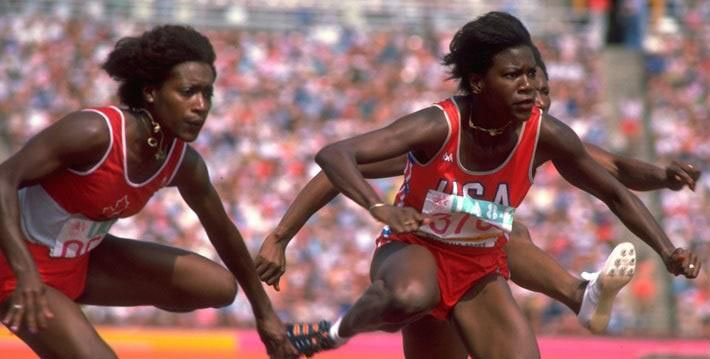
Have A Good Start
Fitzgerald Mosley often uses a quote from former American politician and motivational speaker Les Brown, who said, “You don’t have to be great to get started, but you have to get started to be great.”
Fitzgerald Mosley’s parents, Fannie and Rodger Fitzgerald, were both educators and they encouraged Fitzgerald Mosley to get started in as many extracurricular activities as possible in their hometown of Dale City, Virginia. By participating in gymnastics, softball, majorettes, and track, and learning the piano, violin, flute and piccolo, Fitzgerald Mosley discovered what she loved and was good at and where to focus her attention.
“They were very supportive and stood by me in every aspect of my life,” Fitzgerald Mosley says of her parents. “They celebrated my every achievement, large and small, and I loved to make them proud.”
While she became the first chair flute for the Gar-Field High School symphonic band, Fitzgerald Mosley says she wasn’t very good at softball and grew too tall to be a gymnast. But middle school physical education teacher, family friend, and gymnastics coach Gwen Washington was also the coach of the track team and when it became obvious that Fitzgerald Mosley had outgrown gymnastics, Washington suggested she join the track team because she had seen Fitzgerald Mosley outrun the boys in gym classes.
“So I went out for the track team and started winning races from the very beginning,” Fitzgerald Mosley says. “It wasn’t until I was 12 years old and in the seventh grade that I even discovered my athletic prowess.”
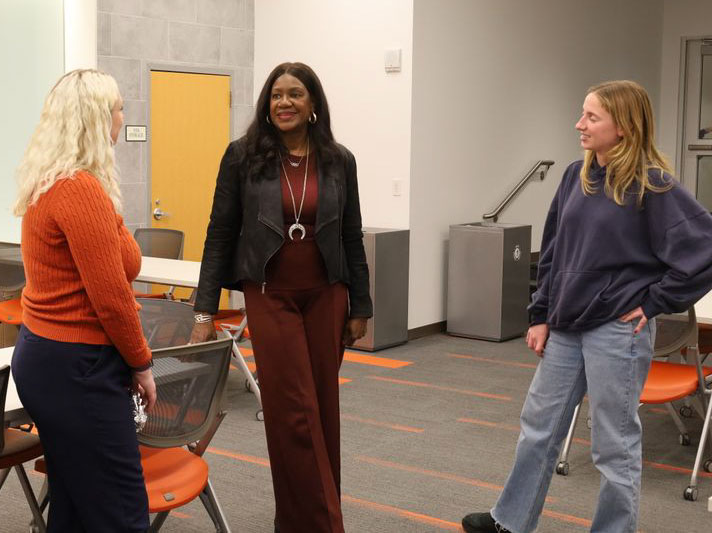
Set High Goals
As a high school freshman sprinter and hurdler, Fitzgerald Mosley helped the track team win its fourth consecutive Virginia state championship. She was a teammate of senior Paula Girven, who represented the United States in the high jump in the 1976 Olympics and qualified for the team in 1980. Their high school track coach, Anne Locket, also led the girl’s gymnastics and basketball teams to state championships.
“Coach Locket said to me, ‘You know, you can be an Olympian someday just like Paula,’ and I looked at her like she was from Mars,” Fitzgerald Mosley says, smiling. “But having a coach believe in you and say that to a youngster at 14 years old, it set me up for great things to come.”
By 1980, Fitzgerald Mosley was 18 and already a track star–and an industrial engineering major–at the University of Tennessee, where she would become a 14-time All-American and four-time NCAA hurdles champion. Like Girven, she made the 1980 Olympic team but didn’t participate because the United States led a boycott of the 1980 Summer Games in Moscow to protest the Soviet invasion of Afghanistan.
Fortunately for Fitzgerald Mosley, she was still in college and had the benefit of having access to coaching, training equipment, and the highest level of competition in college. This was a time when Olympic athletes were strictly amateurs who couldn’t make money off their athletic achievements, and many athletes who qualified for the 1980 Games, like Girven, weren’t able to return for the 1984 Games.
“At that point, people didn’t have these long careers spanning three- and four- and five-Olympic Games that started with my generation because they started to allow us to make money while we were competing,” Fitzgerald Mosley says. “The two other hurdlers that were on the Olympic team with me in 1980 didn’t make it again in 1984, so that was their one and only chance to be an Olympian.”
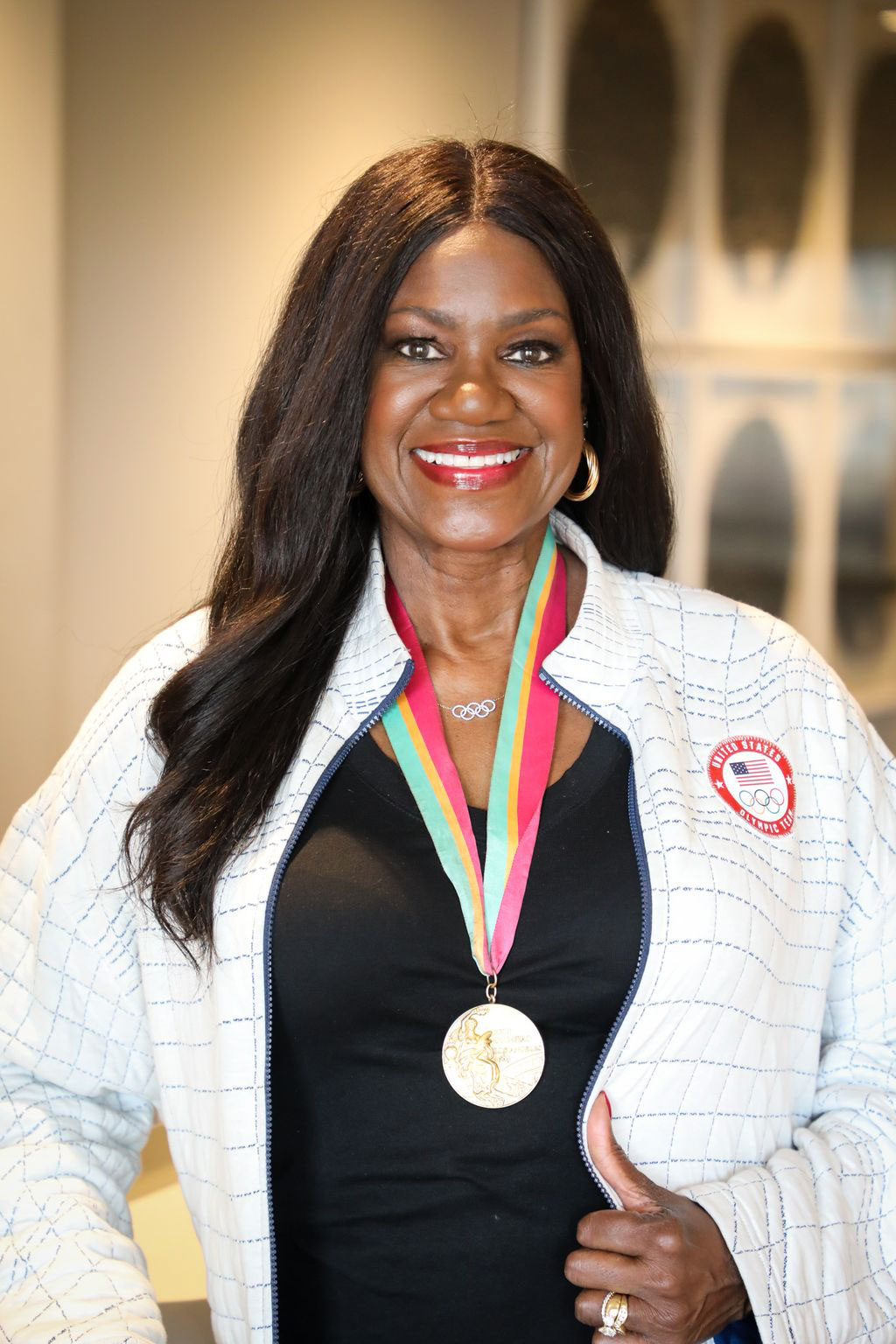
Run Your Own Race
For Fitzgerald Mosley, the last decade of her professional career has been similar to her Olympic performance where she kicked it into an even higher gear to beat the favorite, Great Britain’s Shirley Strong, and win the gold medal.
In 2016, she was named CEO of Laureus, a nonprofit organization that believes sport has the power to change the world. After stints as a senior advisor for Airbnb and president of the FundPlay Foundation, Fitzgerald Mosley was hired for her current position as CEO of Multiplying Good in July 2023. The mission of Multiplying Good is to help people reach their full potential and discover their power to deliver impact and bring about meaningful change.
“I really believe in– and care about–coming to work every day leading an organization that’s ultimately impacting people’s lives in a positive way,” she says. “That’s the utmost kind of thrill for me.”
Over time, Fitzgerald Mosley says all her experiences led to this moment of clarity where she realized she can help people and organizations win gold medals in life and business. That’s her daily focus, whether she’s leading Multiplying Good, serving on the Board of Directors for the Special Olympics, or speaking to a stellar group of graduates from Falk College.
“Where I can show up in the world is to truly help young people derive the benefits of sport participation in communities that otherwise wouldn’t have those opportunities, by funding those organizations, by helping them build their capacity so they could serve more young people, not just in the United States, but around the world,” Fitzgerald Mosley says.
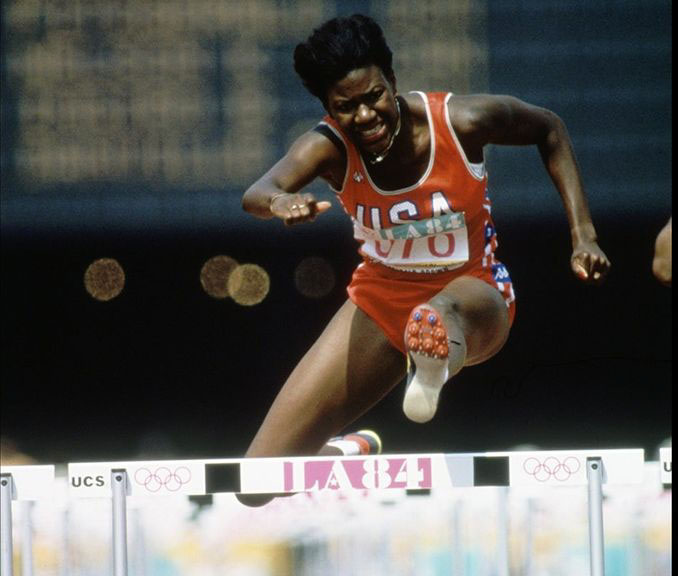
Power Through Hurdles
Like one of Fitzgerald Mosley’s races, the line from Olympic gold medalist to influential executive may have been a relatively straight one, but not without its hurdles.
Fitzgerald Mosley’s bid for the 1988 Olympics was slowed by an ankle injury that required surgery in 1987. Still, she qualified for the Olympic trials and was leading in the finals before she tripped over the last hurdle and missed making the team by 1/100th of a second.
“The hardest team to make in the world is a U.S. team, particularly in swimming and track and field, where you pick yourself, no one picks you,” Fitzgerald Mosley says. “You have strep throat, you hit a hurdle, you fall in a race, you’re injured, sorry, you don’t get to go.”
Fitzgerald Mosley wasn’t able to capitalize financially on her Olympic success the way athletes can today, so she didn’t have a lot of money when she retired from running. But she did have her industrial engineering degree from Tennessee and found a job with a defense contractor, where she was working on projects such as conducting time and motion studies for the M1 Abrams tank or creating software design documents for the Seawolf submarine.
“Don’t get me wrong, these are all important things. And of course, I have the utmost admiration for the people who serve in our military,” Fitzgerald Mosley says. “But I just wasn’t the person to do that kind of work, and I think it was because it wasn’t aligned with my passion.”
After working as president and CEO of Women in Cable Telecommunications (now called The WICT Network), an organization dedicated to empowering women leaders, Fitzgerald Mosley started to hit her professional stride with jobs as Chief of Sport Performance for USA Track and Field and COO of the U.S. Olympic and Paralympic Committee.
“My career in both sport management and nonprofits was born at that point in time, when I realized I didn’t have to train three to six hours a day to participate in sport,” she says. “That was the big light-bulb moment for me to get that opportunity to work first for Special Olympics International and then with the Olympic and Paralympic Committee and have my heartstrings pulled by the mission of the organization.”
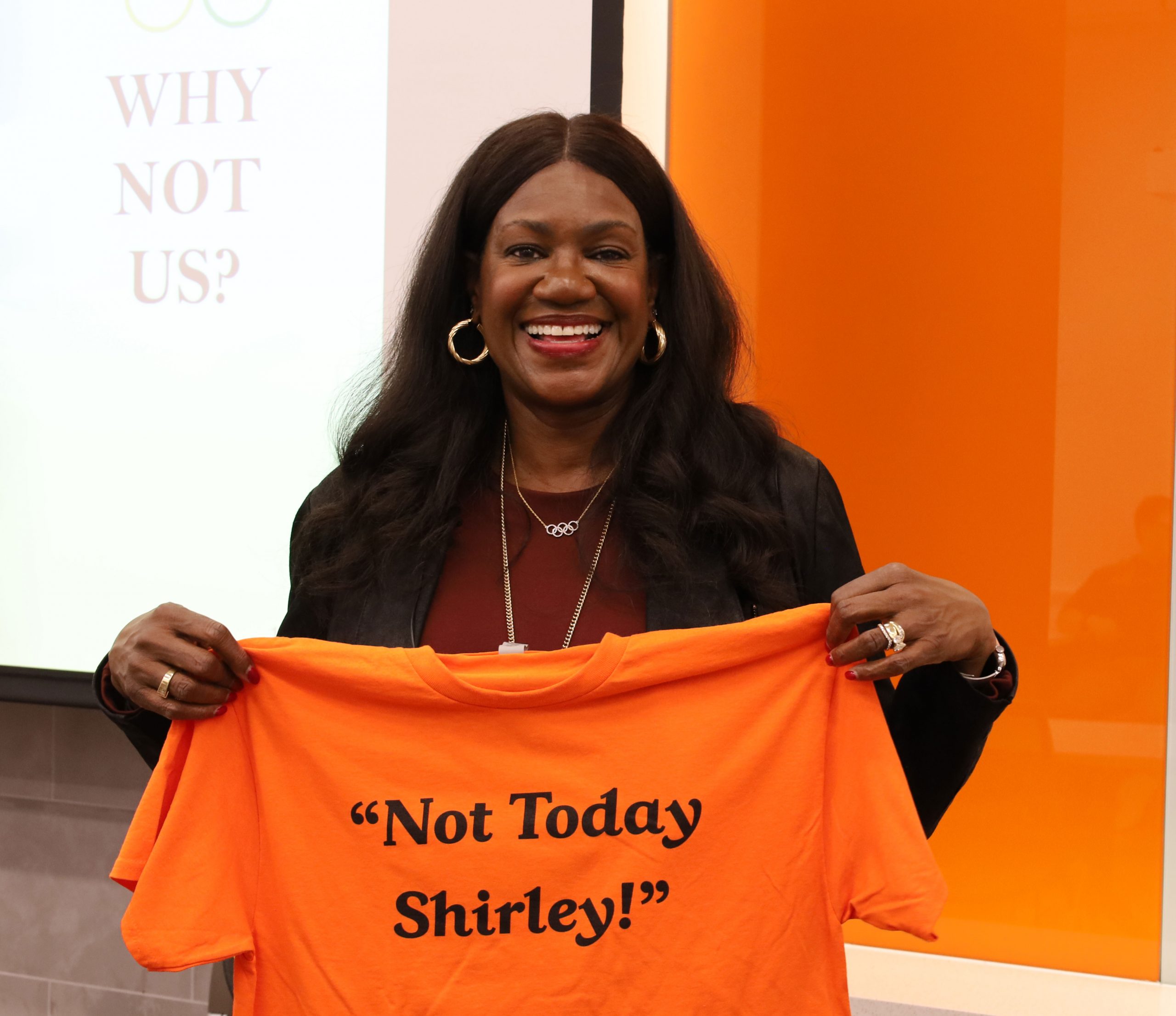
Have a ‘Strong’ Finish (a.k.a. Not Today Shirley)
Fitzgerald Mosley took full advantage of her second chance at the 1984 Olympic Games in Los Angeles, where she needed to beat Strong. At the 1983 World Championships, Strong had defeated Fitzgerald Mosley, a fitness fanatic who noticed that Strong was smoking cigarettes following their race.
“She’s smoking and she just beat me? She will never beat me again,” Fitzgerald Mosley told herself. “The next year (at the Olympics), I saw her smoking a cigarette between the semifinals and finals, and that reminded me of my vow.
“In the finals when we were racing, I saw her out of the corner of my eye, and I said to myself, ‘Not today Shirley,’’’ she says.
Fitzgerald Mosley ran the race in 12.84 seconds, beating Strong by 4/100th of a second to become the second U.S. woman and the first African-American woman to win a gold medal in the 100-meter hurdles. The 1984 track and field events were held in the Los Angeles Coliseum, where Babe Didrikson became the first U.S. woman to win what was then the 80-meter hurdles in 1932.
“It was magical,” Fitzgerald Mosley says. “To be on your home soil and walk into a stadium with 90,000 people screaming ‘U-S-A’ and cheering for you once you win, there’s nothing better.”
Fitzgerald Mosley has been inducted into several halls of fame, but she says perhaps her greatest honor occurred when she was selected as one of eight U.S Olympians to carry the Olympic flag into the stadium during the opening ceremony of the Centennial Olympic Games in Atlanta. Legendary boxer Muhammad Ali capped the ceremony by lighting the Olympic cauldron.
“We had practiced the night before under the cloak of darkness because no one knew who the eight of us were going to be that were walking in,” Fitzgerald Mosley says. “And we didn’t know Muhammed Ali was going to be the one who lit the torch.
“It had a mission impossible-type of feel to it, and that was pretty cool to be in on the inside of that little secret as well,” she adds.
Fitzgerald Mosley says she owes everything to her sport experiences, from winning the gold medal to her college education to meeting her husband, former Brown University football player Ron Mosley, with whom she has two grown children; a son, Isaiah, and a daughter, Maya, who runs track at the University of Maryland. She is most grateful to her parents, who encouraged her to get out there and keep trying until she found her passion.
“I would just say to young people in particular, don’t let your fear of failure get in your way of pursuing your dreams,” Fitzgerald Mosley says. “Because even if you fall somewhat short of the ultimate dream, you’re going to be so much further along toward that dream and that goal than you ever would have been if you didn’t start in the first place.”
